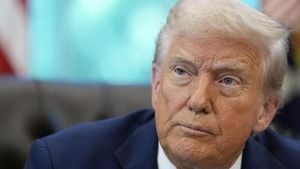The U.S. intelligence community has been rocked by a sweeping and controversial move: Director of National Intelligence Tulsi Gabbard has revoked the security clearances of 37 current and former intelligence officials. The unprecedented action, announced in a memo dated August 18, 2025, and made public the following day, has ignited a fierce debate over the politicization of the nation’s security apparatus and the legacy of investigations into Russian interference in the 2016 presidential election.
According to The New York Post and corroborated by multiple outlets, the list of stripped officials includes prominent figures who served under both Democratic and Republican administrations. Among them are ex-Principal Deputy DNI Stephanie O’Sullivan, Vinh Nguyen (a former top aide to Obama-era DNI James Clapper), and Brett Holmgren, who most recently served as assistant secretary of State for intelligence and research. The move also swept up officials with ties to the Biden administration, such as Maher Bitar, Emily Horne, and Samantha Vinograd, as reported by Nexstar Media and other sources.
The rationale, as laid out by Gabbard and in the official Office of the Director of National Intelligence (ODNI) memo, is stark. These individuals, she said, “abused public trust by politicizing and manipulating information,” failed to safeguard classified data, or violated tradecraft standards. The memo, which was obtained by The Post, declared, “Their access to classified systems, facilities, materials, and information is to be terminated forthwith. Any contracts or employment with the U.S. Government by these 37 individuals is hereby terminated. Any credentials held by these individuals must be surrendered to the appropriate security officers.”
Gabbard, who took the helm as DNI earlier this year, has been outspoken about what she characterizes as the weaponization of intelligence for political ends. “Being entrusted with a security clearance is a privilege, not a right,” she wrote in a statement posted to X (formerly Twitter). “Those in the Intelligence Community who betray their oath to the Constitution and put their own interests ahead of the interests of the American people have broken the sacred trust they promised to uphold. In doing so, they undermine our national security, the safety and security of the American people and the foundational principles of our democratic republic.”
The decision, Gabbard said, was made at the direction of President Donald Trump. This adds yet another layer of controversy, given Trump’s longstanding criticism of the intelligence community and his claims that the so-called “Russiagate” investigation was politically motivated. The officials targeted in this action include several who played key roles in the 2017 Intelligence Community Assessment (ICA) ordered by then-President Barack Obama, which concluded that Russia had sought to interfere in the 2016 election in favor of Trump.
According to Fox News and The Hill, Gabbard has begun declassifying records related to the crafting of the 2017 ICA, which she has called a “treasonous conspiracy” by senior Obama administration officials “to subvert President Trump’s 2016 victory.” The declassified records reportedly show that Clapper, then-CIA Director John Brennan, and then-FBI Director James Comey spearheaded the ICA, emphasizing Moscow’s role in the election and its purported support for Trump. Notably, the final report also incorporated information from the now-debunked dossier compiled by former MI6 agent Christopher Steele, despite warnings from veteran intelligence officers to exclude what they deemed “substandard” intelligence.
Gabbard’s office has released a 44-page classified report by the House Intelligence Committee that raises serious questions about the integrity of the Obama-ordered ICA. The report, as described by Reuters and others, pokes holes in the assessment’s conclusions and process. Adding to the scrutiny, CIA Director John Ratcliffe released a separate review concluding that the ICA was rushed through a “chaotic,” “atypical,” and “markedly unconventional” process, suggesting the possibility of political motives behind its findings.
The fallout from the 2017 ICA has been profound. Its conclusions contributed to years of investigations and political turmoil that dogged Trump’s presidency. The Department of Justice, under Trump, has since opened a grand jury investigation into Brennan, Comey, and Clapper over their roles in the Russiagate probe, according to The New York Post.
The scope of the security clearance revocations goes beyond those directly involved in the ICA. Several officials who had spoken publicly about Trump administration policies or supported the first impeachment inquiry into Trump also found themselves on the list. For example, Beth Sanner, a longtime national security official who has served as a CNN analyst, and Charles Kupchan, who worked at the National Security Council under Obama and Clinton, were included. As The Hill notes, Trump has previously revoked clearances for officials who signed a letter suggesting the Hunter Biden laptop story bore the hallmarks of Russian disinformation, as well as for attorneys at major law firms.
The reaction from the intelligence and legal communities was swift and pointed. Mark Zaid, a national security attorney who has represented clients with revoked clearances, called the move “pure politicization of security clearance process.” He added on X, “These are unlawful decisions that deviate from decades of precedent. Completely unprofessional that individuals are targeted in [a] way that impacts their careers, yet they are not notified before leaking memo to friendly media.” Larry Pfeiffer, a former senior director of the White House Situation Room and ex-chief of staff at the CIA, warned that the decision would “undercut U.S. intelligence,” lamenting the loss of experience and talent from the national security apparatus.
Gabbard, for her part, has remained firm in her position. “Our Intelligence Community must be committed to upholding the values and principles enshrined in the US Constitution and maintain a laser-like focus on our mission of ensuring the safety, security and freedom of the American people,” she wrote. She has argued that those who “betray their oath” by injecting politics into intelligence work have no place in the community, regardless of their prior service or political affiliations.
Yet critics argue that the very act of revoking these clearances on such a broad scale—especially in the absence of public evidence for the alleged violations—risks further politicizing the intelligence process. They warn it could set a dangerous precedent, chilling dissent and discouraging career professionals from offering candid analysis that might conflict with the views of current political leaders.
As the debate rages, one thing is clear: the move has laid bare deep divisions over the role of intelligence in American democracy, the legacy of investigations into Russian election interference, and the boundaries between national security and partisan politics. The full impact of Gabbard’s decision—and the investigations and legal battles that may follow—remains to be seen. But for now, the intelligence community finds itself at the center of another storm, with its credibility, independence, and future direction hanging in the balance.





